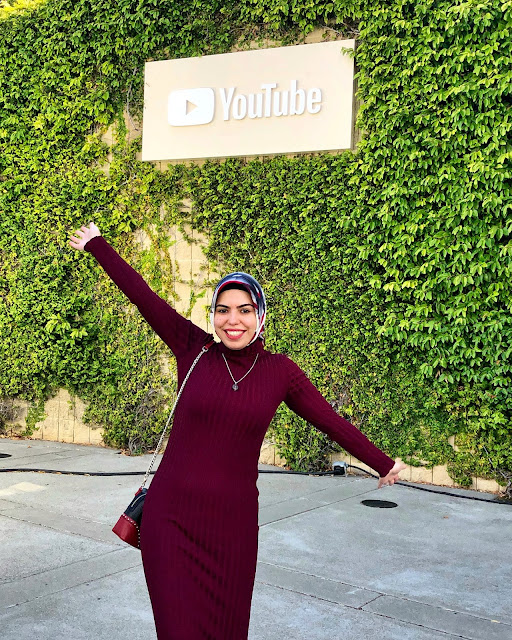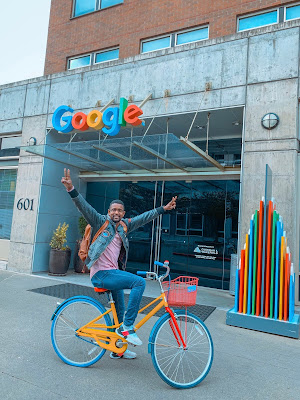Welcome to the 46th installment of our blog series “My Path to Google.” These are real stories from Googlers, interns, and alumni highlighting how they got to Google, what their roles are like, and even some tips on how to prepare for interviews.
Today’s post is all about Rahul Patel. Read on!
Can you tell us a bit about yourself?
I grew up in Whitton, a small town within the borough of Richmond (London). I studied Computer Science at King’s College London but did not complete the degree, I found the concepts very interesting but could not remain engaged enough to execute what was being taught. I didn’t have the best grades at school but that didn’t stop my drive to succeed in being happy with where I worked.
I have seen my parents work for a long time and am inspired by how hard they work. My work ethic slightly differs, however. I prefer to work smarter vs. harder, maintaining efficiency and fun in what I do.
Growing up, I always had such a passion for technology, whether that be fixing computers, routers, networks, or even just staying awake all night playing video games. This is what made me go down the traditional path of working towards a Computer Science degree, but realised that road was not for me. Alongside school and university, I built up a lot of work experience within different areas of work, such as in a technical consultancy, teaching, and project management. This really allowed me to understand how different businesses fall into place within the world and how everything operates.
Just as I decided to leave University, I stumbled upon apprenticeships — something I had known about but not fully pursued. I saw on Instagram that Google had a Digital Marketing Apprenticeship and applied. I went through the process and found myself somewhat inspired, excited, and fuelled with motivation when I started an apprenticeship in October 2018 on the Google Hardware marketing team. I got offered a full time role in a slightly different team six months later and have been at Google ever since.
Slightly separate from work, I love street fashion and am a big gamer. Being able to express myself in what I wear, I find truly fascinating. This inspired me to create a street fashion group at Google which is like an internal community where we all share similar passions. Gaming is also a great way to switch off and escape when you need to, but in a more creative way.
What’s your role at Google?
Currently, I am an Associate Partner Manager, where I look after elements of our Consumer Hardware business at key retailers within the UK. It is a very fluid role where many things feel like a start up — this allows us to almost define our own ways of working and processing, which makes every day feel very different!
I also lead Go To Market for our Create and Wearable portfolio for the UK, which I find very enjoyable. There is a lot of planning and problem solving that is required which makes sure you’re always alert! A cool project I am currently working on is leading the launch for the Google Pixel Buds for the UK.
I have a 20% Project (which is an opportunity to work on something outside of your core role) in Stadia Marketing as well which allows me to follow my creative aspirations of working in Marketing.
I love technology and am surrounded by it everyday at Google! There is so much change with technology happening within the world, and being able to work so closely with it feels very rewarding.
How did the recruitment process go for you?
I found the recruitment process quite enjoyable. There were interviews and challenges which allowed me to research, and feel very comfortable with areas I did not understand before. I was always kept up to date with what stage of the process I was in. This did take the edge off slightly, when thinking about what my future could be.
What do you wish you’d known when you started the process?
I wish I had known to be more confident in myself. The only thing I found that could have held me back was not being able to share my experiences because I did not believe in who I was. Call it a type of imposter syndrome, where I found myself amongst the smartest people applying for a role, and I felt like I should not have been in the mix — but you should never let that hold you back and always believe in yourself.
Can you tell us about the resources you used to prepare for your interview or role?
To prepare, I went over many of the Google qualifications such as the Digital Garage, and even went over interview questions on YouTube. I read books such as “Case in Point” and chose to research Google itself. What the company did, all the many different elements within Alphabet, and why I felt I could fit within it. Watching “The Internship” for inspiration was also part of the process.
Do you have any tips you’d like to share with aspiring Googlers?
No matter what background you find yourself from, what experiences you have, you have got nothing to lose in applying. You can only gain, whether that be interview practice, understanding where to improve yourself, or even landing your dream job. Google doesn’t have a rulebook for candidates they select to hire, it’s about you as an individual and what you have to offer. So be true to yourself and understand what it is that you do best.
Today’s post is all about Rahul Patel. Read on!
 |
| Rahul during a visit to the Google Tokyo office in 2019. |
I grew up in Whitton, a small town within the borough of Richmond (London). I studied Computer Science at King’s College London but did not complete the degree, I found the concepts very interesting but could not remain engaged enough to execute what was being taught. I didn’t have the best grades at school but that didn’t stop my drive to succeed in being happy with where I worked.
I have seen my parents work for a long time and am inspired by how hard they work. My work ethic slightly differs, however. I prefer to work smarter vs. harder, maintaining efficiency and fun in what I do.
Growing up, I always had such a passion for technology, whether that be fixing computers, routers, networks, or even just staying awake all night playing video games. This is what made me go down the traditional path of working towards a Computer Science degree, but realised that road was not for me. Alongside school and university, I built up a lot of work experience within different areas of work, such as in a technical consultancy, teaching, and project management. This really allowed me to understand how different businesses fall into place within the world and how everything operates.
 |
| Rahul at Noogler (new Googler) orientation |
Slightly separate from work, I love street fashion and am a big gamer. Being able to express myself in what I wear, I find truly fascinating. This inspired me to create a street fashion group at Google which is like an internal community where we all share similar passions. Gaming is also a great way to switch off and escape when you need to, but in a more creative way.
Currently, I am an Associate Partner Manager, where I look after elements of our Consumer Hardware business at key retailers within the UK. It is a very fluid role where many things feel like a start up — this allows us to almost define our own ways of working and processing, which makes every day feel very different!
I also lead Go To Market for our Create and Wearable portfolio for the UK, which I find very enjoyable. There is a lot of planning and problem solving that is required which makes sure you’re always alert! A cool project I am currently working on is leading the launch for the Google Pixel Buds for the UK.
 |
| Rahul (right side, middle) and teammates |
I love technology and am surrounded by it everyday at Google! There is so much change with technology happening within the world, and being able to work so closely with it feels very rewarding.
What inspires you to come in (or log-in)every day?
Working at Google has been a dream of mine that I never thought was achievable. When I was at school, I had the opportunity to visit the Google offices in London, which was where I first experienced the wonders of working here. Being around the incredible people is what inspires me to come in every day, whether that be to collaborate on work, to catch up, or to learn more from an inspiring talk or event that happens. Being surrounded by technology enhances that experience, and really allows you to see what impact you have within the world.  |
| Googlers create an ever-changing display of pixel art at the Google London office. |
I found the recruitment process quite enjoyable. There were interviews and challenges which allowed me to research, and feel very comfortable with areas I did not understand before. I was always kept up to date with what stage of the process I was in. This did take the edge off slightly, when thinking about what my future could be.
 |
| Rahul and teammates celebrate the Pixel 3 launch |
I wish I had known to be more confident in myself. The only thing I found that could have held me back was not being able to share my experiences because I did not believe in who I was. Call it a type of imposter syndrome, where I found myself amongst the smartest people applying for a role, and I felt like I should not have been in the mix — but you should never let that hold you back and always believe in yourself.
To prepare, I went over many of the Google qualifications such as the Digital Garage, and even went over interview questions on YouTube. I read books such as “Case in Point” and chose to research Google itself. What the company did, all the many different elements within Alphabet, and why I felt I could fit within it. Watching “The Internship” for inspiration was also part of the process.
 |
| YouTube Space at the Google London office |
No matter what background you find yourself from, what experiences you have, you have got nothing to lose in applying. You can only gain, whether that be interview practice, understanding where to improve yourself, or even landing your dream job. Google doesn’t have a rulebook for candidates they select to hire, it’s about you as an individual and what you have to offer. So be true to yourself and understand what it is that you do best.
































